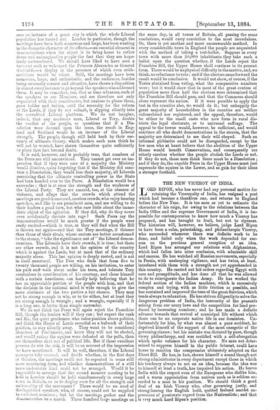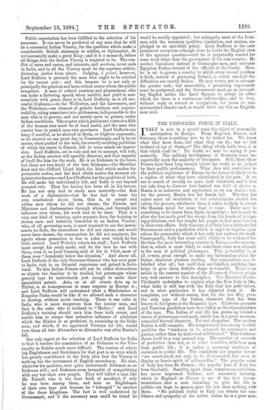THE NEW VICEROY OF INDIA.
TORD RIPON, who has never had any personal motive for retaining the Viceroyalty of India, has resigned a post which had become a thankless one, and returns to England before the New Year. It is too soon as yet to estimate the character of his reign, for owing to the relations between the India Office and the supreme Government of India, it is im- possible for contemporaries to know how much a Viceroy has proposed, and has brought to fruit, but not to ripeness. The historian will, however, we believe, judge Lord Ripon to have been a calm, painstaking, and philanthropic Viceroy, who succeeded whenever there was definite work to be done, and failed only when the work depended for suc- cess on the previous general reception of an idea. Lord Ripon has arranged our relations with Afghanistan, which had fallen into utter confusion, with admirable skill and success. He has watched all Russian movements, especially in Persia, with unsleeping vigilance, and has twice, at least, interfered with them with a strength not yet apprehended in this country. He carried out hi si orders regarding Egypt with care and promptitude, and has done all that he was allowed to do to reinvigorate the Indian Army. He has worked the federal section of the Indian machine, which is excessively complex and trying, with as little friction as possible, and has sustained and improved the tone of the great Services, which tends always to relaxation. He has striven diligently to solve the dangerous problem of India, the insecurity of the peasants arising from our usury laws and the competition for land pro- duced by increasing numbers ; and he has made a definite advance towards that revival of municipal life without which there can be no corporate native life in our dominion. Un- fortunately for him, by what was almost a pure accident, he deprived himself of the support of the most energetic of the governing classes ; but his mistake was dictated by pure, though viewy philanthropy, and was rectified with a self-abnegation which spoke volumes for his character. No man not deter- mined to suppress himself in the public interest, could have borne to sanction the compromise ultimately adopted on the Ilbert Bill. He has, in fact, shown himself a sound though not strong administrator in every department except those in which his tendency always to act on an idea, because the idea was to himself at least a truth, has impaired his action. He leaves India with the respect even of the Europeans who dislike him, and a warm appreciation from natives such as is seldom ac- corded to a man in his position. We should think a good deal of an Irish Viceroy who, after governing justly, and strengthening the English hold, quitted Ireland amidst ex- pressions of passionate regard from the Nationalists ; and that is very much Lord Ripon's position. Public expectation has been fulfilled in the selection of his successor. It can never be predicted of any man that he will be a successful Indian Viceroy, for the qualities which make a considerable British statesman or soldier, or diplomatist, do not necessarily make a great King ; and it is a monarch, before all things, that the Indian Viceroy is required to be. The con- flict of races and castes, and interests, and services, never ends in India, and to all the Viceroy must be the supreme arbiter, decreeing justice from above. Judging, d priori, however, Lord Dufferin is precisely the man who ought to be selected for the vacant post ; and this because he is not only or principally the gracious and keen-witted orator whom the public recognises. A man of refined courtesy and pleasantness, who can make a flattering speech when needful, and yield in non- essentials with grace, there is in Lord Dufferin, as in all suc- cessful Irishmen,—in the Wellesleys, and the Lawrences, and the Wolseleys,—an element of granite hardness and impene- trability, rising sometimes into pitilessness, indispensable to the man who is to govern, and not merely seem to govern, under Indian conditions. The sceptre which guides and controls a fifth of the human race must be of hard metal, and the man who cannot bear to punish may ruin provinces. Lord Dufferin can hang if needful, as he showed in Syria, or frighten opponents, as he showed on one great day in Constantinople, and is by no means, when pushed to the wall, the sweetly-soothing politician of which his career in Canada left in some minds an impres- sion. Lord Dufferin, set to rule and not to manage, will rule, as the Indian services will speedily discover, and that capacity of itself fits him for the work. He is an Irishman to the bone, but there are two kinds of the best Irishman—the Sheridan kind and the Clifford Lloyd kind, the kind which makes the persuasive orator, and the kind which makes the sternest ad- ministrator known—and Lord Dufferin has the qualities of both. He will make his individuality felt, and India is not beyond personal rule. Then his history has been all in his favour. He has not only had to study men narrowly—the first work of a diplomatist—but he has had to trust his own conclusions about them, that is, to accept and utilise men whom he did not choose, the Princes and Ministers and Ambassadors through whom, and through his influence over whom, his work had to be done. That is a very rare kind of training, quite separate from the training to choose men, and infinitely beneficial to an Indian Viceroy, who, of all governing men, is most required to use the instru- ments he finds, the counsellors he did not choose, and would never have chosen, the commanders he did not nominate, the agents whose promotion is due to rules over which he has little control. Lord Wolseley selects his staff ; Lord Dufferin must accept his ready made, and do the best he can with them, even if, as Lord Canning said of his in 1858, most of them were "hopelessly below the situation." And above all, Lord Dufferin is the only Governor-General who has ever gone to India rich in an Oriental experience not gained in India itself. To him Indian Princes will not be either abstractions or objects too familiar to be studied, but personages whose general type he understands just enough to make their specialities patent. Asia, or at all events Asia up to Thibet, is as homogeneous in some respects as Europe is ; and Lord Dufferin will understand what a Hindostanee or Bengalee Pasha would be like if we allowed such a character to develop, without much teaching. There is one ruler in India who is more dangerous than the insular man, and that is the ruler who is inclined to " Medize ;" and Lord Dufferin's training should save him from both errors, and enable him to escape that seductive influence of adulation which the Hindoo is as proficient in exercising as the Irish- man, and which, if we appointed Viceroys for life, would turn them all into Alexanders as Alexander was after Darius's fall.
Our only regret at the selection of Lord Dufferin for India is that it renders the nomination of an Irishman to the Vice- royalty in Dublin much more difficult. The custom of select- ing Englishmen and Scotchmen for that post is an error which has greatly contributed to the Irish idea that the Viceroy is nothing but the instrument of English ascendancy. No man, whatever his qualities, ever quite understands Irishmen as an Irishman will ; and Irishmen seem incapable of sympathising with any but their own people. They will follow a man like Mr. Parnell, who is the least Irish of mankind, if only he was born among them, and hate an Englishman of their own type just because he " belonged " to another of the three kingdoms. The fact is well understood by Government, and if the necessary man could be found he , would be readily appointed ; but unhappily, most of the Irish- men with the necessary qualities, reputation, and station, are pledged to an anti-Irish policy. Lord Dufferin is the only prominent exception—though even he holds the English view of the agrarian question—and he is perpetually wanted for some work other than the government of his own country. He soothes Canadians instead of Connaught men, and restrains Egyptian Pashas instead of the officials at the Castle. Now, he is set to govern a country in which every second problem is Irish, instead of governing Ireland, in which one-half the difficulties are exactly Indian. He may return yet to attempt the greater task ; but meanwhile, a promising experiment must be postponed, and the Government must go on persuad- ing English nobles like Lord Spencer to accept an office which for them is a continuous self-sacrifice, and to bear, without reply or reward or recognition, for years on end, systematised slander such as would drive any but an English- man mad.



































 Previous page
Previous page